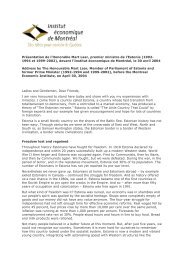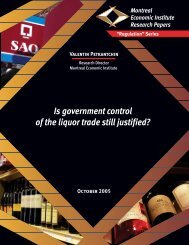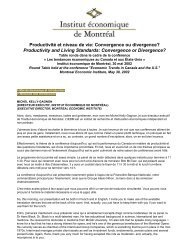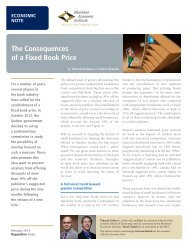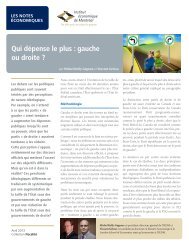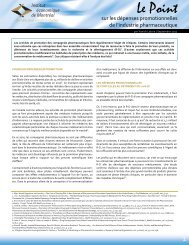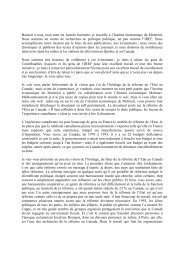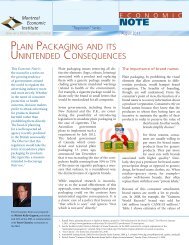Publication (PDF format) - Institut économique de Montréal
Publication (PDF format) - Institut économique de Montréal
Publication (PDF format) - Institut économique de Montréal
You also want an ePaper? Increase the reach of your titles
YUMPU automatically turns print PDFs into web optimized ePapers that Google loves.
Why New International Taxes for Development Are Inefficient2) Voluntary solidarity contributions:These are private initiatives, encouragedand facilitated by governments, wherebyprivate companies allow their customersto voluntarily contribute to the financingof international <strong>de</strong>velopment projects.“(Red),” for instance, is a licencedtra<strong>de</strong>mark that tells consumers that theproducer gives 50% of its profits for goodsso tagged to the Global Fund for thepurpose of fighting HIV/AIDS. 163) Frontloading and <strong>de</strong>bt-based instruments:The International Finance Facility forImmunization (IFFIm) issues bonds oncapital markets that are guaranteed byfuture official <strong>de</strong>velopment assistancecommitments from eight donorgovernments. The World Bank issues bondsto finance <strong>de</strong>velopment or climate changeadaptation and mitigation projects. 17 Donorgovernments may also reduce the <strong>de</strong>bts of<strong>de</strong>btor governments as a way for the latterto finance health expenditures (through theGlobal Fund, for example). 184) State guarantees, public-private incentives,insurance and other market-basedmechanisms: Un<strong>de</strong>r this title, UNDPinclu<strong>de</strong>s different forms of subsidies—forvaccines, for pollution reduction in <strong>de</strong>velopingcountries, for insurance againstnatural catastrophes, etc. 19IFD financing mechanisms have raisedrelatively little money thus far, but estimates varywi<strong>de</strong>ly <strong>de</strong>pending on what counts as IFD. Theyrange from US$6 billion to US$57 billion between2000 and 2008, 20 compared to US$133 billion inofficial <strong>de</strong>velopment assistance for 2011 alone.According to a World Bank study, less than 7% of<strong>de</strong>velopment assistance is financed by IFD. 2116. UNDP (2012), pp. 11 and 44. See also www.joinred.com.17. UNDP (2012), p. 11.18. Sandor (2009), p. 1.19. UNDP (2012), pp. 14-16.20. Ibid., p. 9; Sandor et al. (2009), p. 3.21. Girishankar (2009), p. 8.1.2 IFD TaxesAsi<strong>de</strong> from the German government’s allocationto environmental projects from its sales of pollutionallowances, the airline ticket tax is the only currentIFD tax. 22Asi<strong>de</strong> from the German government’sallocation to environmental projectsfrom its sales of pollution allowances,the airline ticket tax is theonly current IFD tax. ,,Launched in 2006, it is now fully implementedby the governments of Cameroon, Chile, Congo,France, Madagascar, Mali, Mauritius, Niger, andthe Republic of Korea. 23 The tax is ad<strong>de</strong>d to individualpassengers’ ticket prices, and collected byairlines, on flights <strong>de</strong>parting from these participatingcountries. The schedule usually levies alow amount on domestic and economy flights,and higher amounts on business or first class. InFrance, for example, the schedule is the following:,, €1 perpassenger <strong>de</strong>parting from France in economyclass; €10 in business and first class; €4 per passenger<strong>de</strong>parting from France in economy class; €40in business and first class. 24Participating governments channel the proceedsof their airline ticket tax into UNITAID, which<strong>de</strong>rives two thirds of its resources from this source. 25Thus far, the tax has raised about US$200 milliona year on average over the past six years, mostlyfrom France. Chart 1 shows the amounts (in euros)collected by the French government since 2006. TheUN estimates its potential at between US$1 billion22. The government of Norway pays part of a carbon tax into UNITAID,but this is not usually consi<strong>de</strong>red as an IFD tax. An exception isAssemblée nationale (2011), which suggests that it is an IFD tax (p. 9).23. See http://www.unitaid.eu/fr/les-financements-innovants.24. République Française (2013). As we are going to press, the Frenchgovernment is announcing an increase of the tax of 12.7% in 2014; see“La taxe Chirac sur les billets d’avion revalorisée <strong>de</strong> 12,7% en 2014”,Le Figaro, July 31, 2013.25. UNDP (2012), p. 10.Montreal Economic <strong>Institut</strong>e 9



